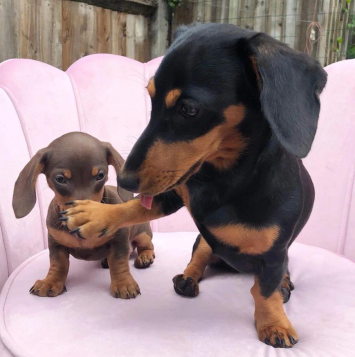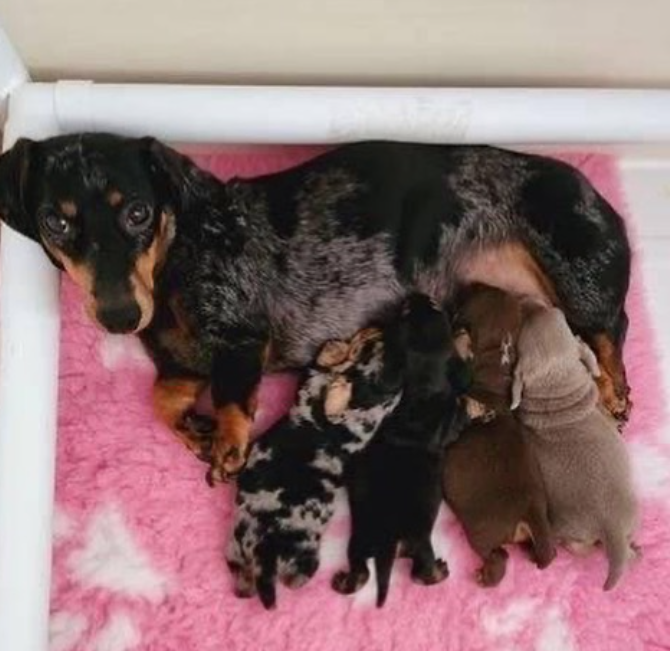
Bringing a new puppy into your home may feel like one of the most exciting and nerve-wracking events in your life. So how do you prepare for it?
New puppies are going through a major transitional phase as they leave mom and enter a new home with new sights, sounds, smells, and even exposure to new creatures (human or animal). Keeping them on a regular dog schedule can be really helpful for both the puppy and new family. Regular schedules become habits, making training easier, ensuring needs are met, and giving a sense of predictability to everyone. While these schedules of course include potty breaks, it's also important to consider how puppy sleeping and feeding schedules, training sessions, and the habits of your family’s humans will work together to create a routine your puppy can get used to, hopefully creating household harmony.
Morning Routine Puppy Schedule
For pet owners who are morning people, a morning puppy routine might be easy to nail down. While it might be a little more difficult for those of us who aren’t early birds, it’s still an important part of puppy development, and your development as a dog owner.
In general, until routines are solidified, it’s recommended puppies are confined in a simple but comfortable kennel when unattended – this includes overnight. This establishes not only a physical boundary, but also a comforting bedroom-like space the puppy becomes accustomed to spending time in.
Upon waking, whether you or the puppy are up first, it’s key to get the puppy outside (or to an appropriate receptacle) immediately to get that puppy schedule started. Bringing them consistently to the location you want them to “go” helps them associate the location with the desire to go outside. As their skills develop and they learn when and where to go potty, you can shift to training them to “ask” to go when they need it using tools or behavioral cues.
Dog feeding schedules can go hand in hand with potty training too. Follow up a successful morning potty with breakfast. Be sure to feed an appropriate puppy food in an amount recommended by your veterinarian. Predictable feeding schedules simplify life for pet owners and promote appropriate growth in puppies. Once your puppy has eaten, it’s time to take another potty break. Just as in humans, you can assume there will be an after-breakfast bowel movement, so anticipating this might just avoid a messy accident.
After the boring morning events are over, it’s time for bonding. Playtime and training can happen simultaneously, giving you a chance to learn about your puppy, and giving your puppy a chance to learn from you. Why do puppies bite hands? Because normal puppy-to-puppy playtime involves a lot of chewing, biting and growling. Playtime between a puppy and a human needs to be different, so use playtime to gently teach what you expect out of these playful interactions.
Mid-Day Dog Routine
Frequent potty breaks throughout the day are essential, and can mostly follow the same pattern as breakfast, though you may or may not provide mid-day meals. With a new puppy, it’s ideal for someone to make frequent trips home during the day (or stay at home, in those early weeks) to ensure potty breaks happen in a timely manner, and the puppy develops a stable expectation of human interaction.
Playtime and training sessions can be repeated in the afternoon, to continue providing your pup with an outlet for energy, while also reinforcing desirable behaviors. In the early stages, don’t mix up training routines too much, as consistency helps solidify behaviors better than variety.
Between potty breaks, feeding, and play/ training sessions, your pup needs some solid nap time to recover their energy and continue healthy growth patterns. Puppy sleep schedules don’t need to be as regimented as feeding and potty breaks, since pups will naturally fall asleep almost anytime/ anywhere when they need to. Still, always make sure their bedding is clean and they have a comfortable space to retreat to to sleep.

Evening Puppy Routine
Evening routines can closely mimic morning and afternoon, though you may want to add a couple extra potty breaks to limit nighttime accidents.
As soon as you return home from work or errands, or once your typical evening is winding down, be sure to take puppy out to potty. Their dinner can happen around the same time as yours, to help train your puppy to understand typical mealtimes (and avoid begging at the table).
Be sure to take them out for another after-dinner potty break, build in some play and training time to the evening, and then head out to let them relieve themselves every couple of hours until bedtime.
Puppy’s Sleep Schedule
Bedtime routines should begin with, you guessed it, another potty break. Frequently offering the option to go will build consistency in your pup’s habits, reinforcing the idea that going in a particular area is desirable. Late night snacks aren’t typically recommended unless your pup has been diagnosed with a condition that requires it (your veterinarian can help you decide). Offering food just before bedtime could stimulate a late night bowel movement, leaving a mess for you to clean up and possibly complicating the potty training process.
While some gentle playtime before bed is a great idea for bonding, avoid activities that are too stimulating, so your puppy isn’t “hyped up” while you’re looking to settle in. Bring them with you to sit and watch late night television, give them a cuddly toy to snuggle with, and then once everyone is ready for bed, return puppy to their designated sleeping area.
If you notice your pup has trouble calming down, or that they appear anxious being left alone in their designated space, consider offering a warm (not hot) water bottle and cozy blankets to nest in, and play a little classical music, which animal experts believe has a calming effect in stressful environments.
Adjustments for Puppy Growth and Age
Especially in the early weeks, puppies need to go potty frequently, and this often means overnight too.
8 Week Puppy Schedule
A puppy schedule at 8 weeks requires potty breaks at least every 2 - 3 hours throughout the day and night. This might be disruptive to normal work and sleep habits, but it’s important to understand that puppies are going through a major adjustment that in some ways, loosely mimics the development of a newborn baby. Feeding 3 – 4 times a day is very typical, and meals should be evenly distributed across the day as time allows, and associated with potty breaks as possible. Naps will likely be frequent, and can easily fall between the major daytime events (potty break/ mealtime/ playtime). A pup that feels comfortable, has a full tummy, and had some valuable bonding time is more likely to settle in for much needed rest between sessions.
10 Week Puppy Schedule
A 10 week old puppy will often be better adjusted to household schedule if they’ve had a couple weeks of established consistency. Potty breaks every 3 - 4 hours become the norm, and your puppy may start being proactive about expressing needs and performing desirable behaviors – like asking to go potty or waiting enthusiastically for specific mealtimes. Accidents are still going to happen, and night-time potty breaks are likely still necessary, but these incidents become outliers instead of expected. Meal times may be cut down to just 2 or 3 per day as time allows. Because puppies continue to grow until they’re 6, 12, or even 18 months of age, you can expect recouperative naps to still be essential in this phase. Puppies typically need 18 – 20 hours of sleep per day, an incredible amount as compared to the average human.

Puppy Schedules for 12 Weeks and Older
Puppies 12 weeks and older, if raised with consistent and positive schedules, will really start to settle into a routine. Potty breaks will be easier because the pup may successfully walk themselves out to the designated area to urinate and defecate, though be cautious – around this time they may start exploring and get distracted from the task at hand. Be sure to positively reinforce what you want to happen – reward a urination or bowel movement as soon as possible, so your pup learns that going potty is the first priority when going outside, and exploring should come second. Continue feeding 2 – 3 times per day; check with the puppy’s veterinarian at your vaccine visits every 3 – 4 weeks to make sure the puppy’s weight is appropriate, and adjust feeding plans accordingly. Keep encouraging naps! Even adult dogs need anywhere from 8 – 14 hours of sleep, and growing puppies will always need more. Don’t be shocked or concerned if your puppy’s naps seem to absorb most of their between-meal time.
Tips for Puppy Schedule Building Success
Consistency is the key to success in a multitude of areas, but especially in creating a puppy schedule. Since there’s a communication barrier between the human and canine species, the best way to teach a puppy how you want them to behave is consistency in routines and positive rewards; this includes meeting their needs, providing learning opportunities, and helping them adapt to your normal day, while making it a positive experience they want to maintain.
Avoiding perfectionist tendencies is a surefire way to bring positivity to this new relationship with your puppy. Looking for perfect outcomes only brings frustration when you’re dealing with the canine equivalent of an infant who can’t learn as quickly as you do. Reward the positive events, manage the undesirable events, and provide lots of love in between. Avoid disciplining normal puppy behaviors like having accidents – they're still learning and punishment often gets misinterpreted by the recipient in unhelpful ways.
Involve the Whole House in Creating a Consistent Puppy Schedule
For many of us, work and sleep could get in the way of good habit-forming with a new puppy. Getting everyone in the household involved in these routines or hiring outside help (friends, family, or paid help like a pet sitter) can help provide social stimulation for the puppy while also providing for their needs. If you work long hours, consider having someone else let the puppy out for potty breaks, mid-day meals, and playtime while you’re away.
And remember, positive reinforcement brings the most successful learning outcomes when it comes to training and habit forming. Using treats and other methods for positive reinforcement will provide encouragement to perform desirable behaviors, giving your pup the best chance at meeting your expectations. Punishment for behaviors we humans consider “bad” often get confusing for puppies who don’t speak our language, and punishment can actually be harmful during certain developmental stages.
Healthcare and Insurance for Your Puppy
While providing for your puppy’s needs at home is essential, you can’t discount the importance of good healthcare. Before bringing your new puppy home, be sure to establish care with a veterinarian and get their first appointment scheduled.
New puppy healthcare can be expensive, and puppy insurance can pave the way for a lifetime of affordable healthcare. Enrolling in an insurance plan early means less worry that your pup might develop a condition that might not be covered if insurance is sought after the diagnosis has been made (known as a pre-existing condition). An optional puppy wellness plan can even assist with routine healthcare costs, helping cover vaccines and even spay/ neuter surgery when the time comes. During these formative veterinary visits, some important discussions will include a recommended vaccine schedule, starting puppy heartworm medication, and even long-term considerations such as pet dental care. Pet insurance or a wellness plans may include pet dental insurance. Your veterinarian will carefully evaluate your pup’s needs and help create a basic healthcare plan to get them started healthy, and keep them healthy as they grow up!